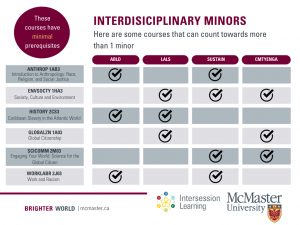Interdisciplinary Minors
An Interdisciplinary Minor spans across several academic disciplines to broaden your perspective on the topic.
Students interested in pursuing an Interdisciplinary Minor are encouraged to consult with an academic advisor from their home Faculty to verify eligibility and for assistance in course selection and planning.
A Minor is a distinction that a student can receive on their transcript upon graduation. It is not a degree. You are required to take 24 units from a specific Course List. You can take a Minor that is completely unrelated to your Major – that’s the point! Minors are an opportunity to show you have interests that are outside your main area of study.
Benefits of pursuing an Interdisciplinary Minor include diversifying your academic journey, gaining transferable skills, collaborating with community partners, gaining a global perspective, and sharpening critical thinking.
You can start your minor by enrolling in a class that is on the Course List for the Minor(s) you are looking to pursue. See the section below for more details.
Depending on your program requirements, you may be able to use your elective units towards the completion and declaration of a Minor.
Did you know that there are several courses that can count towards more than 1 Minor?

* This image is an example of courses, with minimal prerequisites, that are open to students Level I and above, which can be used towards the completion of several Minor requirements.
There is no guarantee that a student will be able to automatically enrol in a course from a Minor Course List that is full. Students should plan in advance, always connecting with their home Faculty or academic advisor to determine the best plan.
One of the benefits of completing an Interdisciplinary Minor is that there are over a dozen eligible course options on each of the Course Lists. So, if one course is full, you have the option to choose from a variety of others that can be applied towards the completion of your Minor.
Refer to the Academic Calendar for more details on Course Lists.
Explore some of MCMaster's Interdisciplinary Minors
Africa and Black Diaspora Studies Requirements
The Interdisciplinary Minor in Africa and Black Diaspora Studies is made up of courses spanning across more than a dozen departments. A Minor in Africa and Black Diaspora Studies provides students with in-depth understanding of Black and African-diaspora peoples and societies around the world.
Community Engagement Requirements
The Interdisciplinary Minor in Community Engagement allows students to deepen their understanding of communities and develop skills for principled and effective engagement. The minor is designed to provide a foundational knowledge and skills for participation in communities, regardless of the student’s primary field of study. The interdisciplinary nature of the minor allows for a broad knowledge base from which to establish relationships with a range of communities both locally and globally.
Globalization Studies Requirements
The Interdisciplinary Minor in Globalization Studies provides students with the opportunity to explore the complex idea of globalization from a multi-disciplinary perspective. Students will have the opportunity to complete courses from the Social Sciences, Humanities, Health Sciences and Science faculties that cover a wide variety of themes related to globalization, and will be able to tailor their course selection according to their interests.
Latin American and LatinX Studies Requirements
Latin American Studies is the interdisciplinary approach to explore the histories, linguistic traditions, literatures, cultures, societies, geographies, archaeologies, identities, migrations and diasporas of Latin America and its peoples.
LatinX Studies is the interdisciplinary approach to exploring the histories, migration patterns, race and ethnicities, identity-formation, geographies, and experiences of the LatinX/Latin American communities inhabiting diasporic locations in Canada and elsewhere in the world.
The Minor in Latin American and LatinX Studies exposes students to methodologies, knowledge, and theoretical frameworks for understanding “What is Latin America?” and “What are LatinX Studies?”
Sustainability Requirements
Addressing sustainability in our society poses complex challenges that require interdisciplinary solutions. Sustainability is frequently taught in silos within individual disciplines, and most often within individual and isolated courses.
The goal of the Minor is to alter this pedagogy and teach sustainability both within and across disciplines. The Minor provides a path for students to study diverse aspects of sustainability from different disciplines and integrate them into a cohesive whole. The scope and definition of sustainability used for the Minor are guided jointly by the United Nations Sustainable Development Goals and the Association for the Advancement of Sustainability in Higher Education.
Civic Vitality, Democracy, Elections Requirements
The CIVDEM Interdisciplinary Minor equips students to work towards strengthening civic vitality, democratic resiliency, and electoral integrity, as well as empowering the underrepresented to participate in the political and electoral process. Students gain the foundations of knowledge, focused thematic expertise, and research competencies with respect to core areas (Civic Vitality, Democracy, Elections) that are local, national and global in scope. They are encouraged to think beyond the walls of the classroom to prepare for a lifetime of civic learning and practice, built on connecting with a large and effective network of advocates, innovators, practitioners, researchers and policymakers who are working to advance civic engagement, democratic processes and institutions, electoral management and integrity.
Hear what our students have to say!
Meet Aaron

Meet Wendy

Meet Sofia

Meet Enoyo

Meet Sufal


